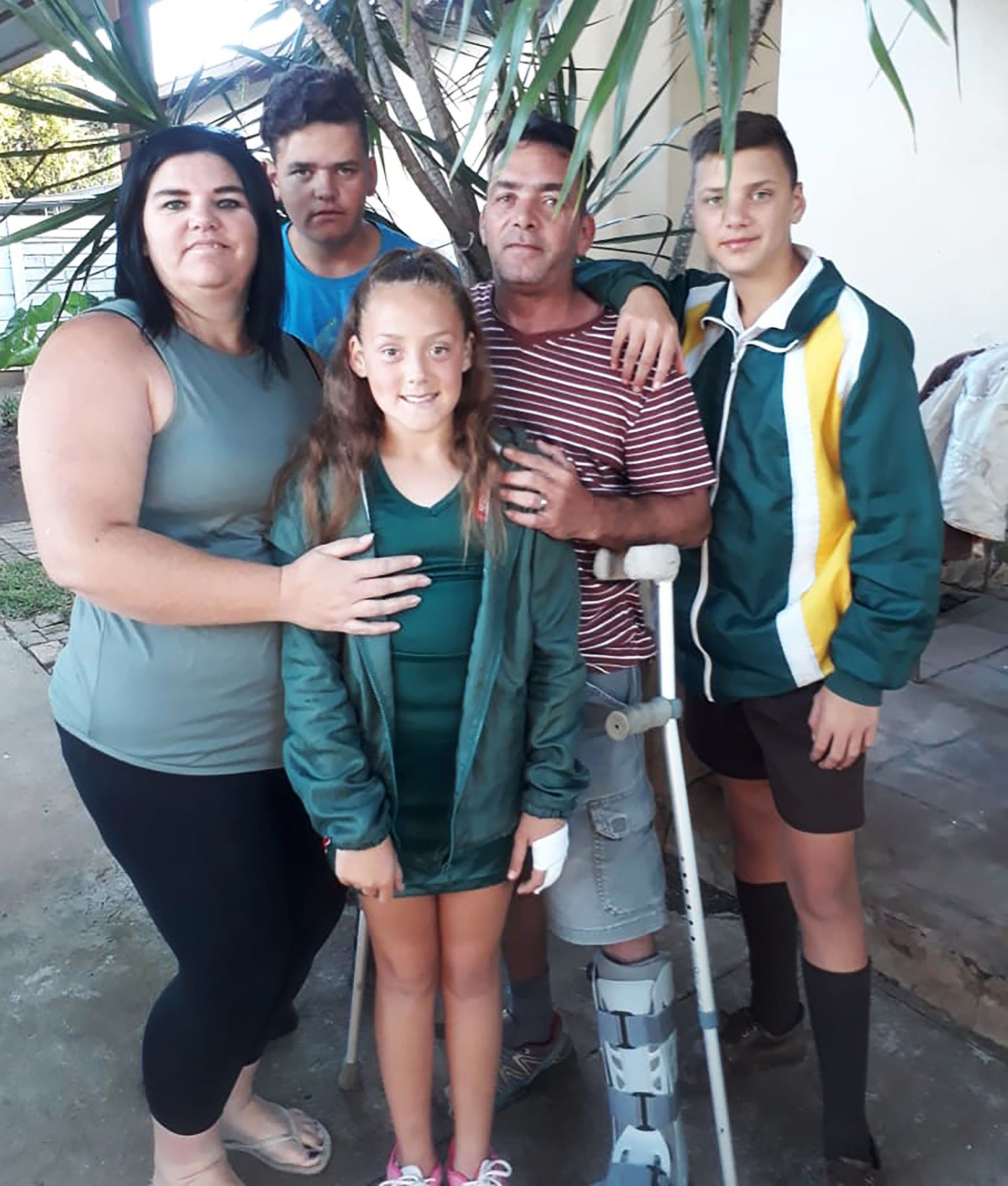Coming together to change a life
Stephen Terry, pictured here with wife Desiré, eldest son Xavier (back left), son Damion (right) and daughter Zanél (front), is recovering well from a life changing procedure performed at Netcare Montana Hospital.
Combined efforts of healthcare professionals give father of three hope for the future
As a young man of just sixteen, Stephen Terry was the victim of a near fatal electrical accident that dramatically affected his mobility. Now, 29 years and one complex procedure later, he has been given a new lease on life thanks to a combined effort to set this dedicated father of three on a path to recovery.
According to Dr Etienne Maritz, an orthopaedic surgeon practising at Netcare Montana Hospital, Stephen had been living with a severe injury to his left foot, including nerve damage, resulting in acute ankle pain and the inability to walk normally.
“Stephen had been unable to walk properly and as a result his day to day work and home life had been badly impacted. It seems that through all the years he did his best to live productively, trying to provide for his family but his quality of life had certainly been impacted and he was experiencing a great deal of unnecessary ongoing pain and discomfort,” he notes.
Stephen had sustained the injury from an accident that he describes as having radically changed his reality from one moment to the next. “At the time I was just a teenager, out playing with friends on our street one evening when the ball got stuck up in a tree. Without thinking twice, I climbed up to fetch it and unknowingly touched an exposed electrical cable that was hanging down.
“I woke up three days later to the news that 93 000 volts of electricity had passed through me in that moment. I was thrown backwards and landed against a large rock. I was lucky to be alive but my back had been broken and I was paralysed for six months. I had to learn how to walk again, which fortunately I could do. However, the injury to my left foot got worse and worse, until eventually I could only walk on the side of my foot,” he says.
Dr Maritz was made aware of Stephen’s case via the community outreach initiative of local radio station Groot FM, and took an interest in trying to help Terry receive the medical attention he needed.
“When I heard about Stephen’s case I contacted my colleague Dr Pieter Coertze, who is also an orthopaedic surgeon practising at the hospital, to see if we could assist him. We conducted a preliminary examination, during which we did an assessment and took some X-rays. It was clear that with a little assistance from all the necessary parties involved, we would be able to help Stephen.
“While the operation was fairly complex as it effectively involved three procedures, we were able to do these at the same time and on a day patient basis, with another colleague of ours practising at the hospital, anaesthetist Dr Gideon Haasbroek, also volunteering his time and expertise for the operation.
“It was very much a team effort, with Netcare Montana Hospital supporting us by waiving the hospital fees while SA Biomedical sponsored the specialised suturing and anchoring materials required,” says Dr Maritz.
“The three procedures we performed during the operation were the lengthening of one of the tendons, a tendon transfer from one part of the foot to another, and the reconstruction of an ankle ligament. All this was done in an effort to rebalance Stephen’s foot.”
According to Dr Maritz the procedure, which was performed in March, will result in a much improved gait for Stephen, which will have a positive impact on his daily life and ability to work, and may even make it possible for him to participate in certain recreational sports.
While a three month healing period is necessary before the true success of the operation can be assessed, Stephen says that he is already experiencing some encouraging signs. “My foot is starting to straighten and for the first time in 29 years I can feel all of my toes.
“I will start to do physiotherapy soon and am enjoying the sense of possibility for the future that this experience has given me. What I am looking forward to most is taking care of my wife and our three children, who are all still in school. I have been working as a truck driver and have been getting more and more used to it. And in my spare time, I will be enjoying fishing at the dam.
“I cannot thank everyone enough for this priceless gift – the doctors for their time and efforts, Netcare Montana Hospital where I was so well looked after by the amazing staff, SA Biomedical for assisting with the materials for the operation, and of course Groot FM for connecting me with this wonderfully supportive network of people and companies. I would also like to say a big thank you to my boss André Olivier Snr and everyone else at Tshwane Fire Spinklers for their support during this time, and to my sister in law Chantelle Terry who contacted Groot FM and put this all into motion. The experience has changed my life,” says Stephen.
Ben Rood, general manager at Netcare Montana Hospital, said that the hospital and its staff members were delighted to hear of Stephen’s progress and are most glad to have played a part in this initiative. “It is a privilege to serve our community and truly heart warming when such a significant difference can be made in the life of an individual. We thank the doctors whom we are honoured to have practising here at our facility for their generosity and we wish Stephen all the best for a brighter future ahead,” he concluded.













